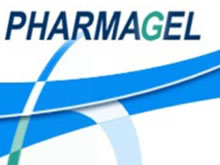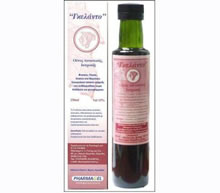
ΠΡΟΙΟΝΤΑ - Aerius Film-Coated Tablets and Oral Solution
Name of the medicinal product: Aerius 5 mg Film-Coated Tablets and 0.5 mg/ml Oral Solution.
Qualitative and quantitative composition: Each tablet contains 5 mg desloratadine and lactose monohydrate; each ml of oral solution contains 0.5 mg desloratadine and 150 mg/ml sorbitol. For a full list of cxcipients see SPC.
Indications: Aerius Film-coated tablets and Oral Solution are indicated for the relief of symptoms associated with allergic rhinitis and urticaria.
Posology and method of administration: Allergic rhinitis and urticaria: Adults and children 12 years and over : One 5mg film coated tablet or 10ml (5mg) of oral solution once daily. Children 6-11 years of age : 5ml (2.5mg) of oral solution once daily; children J-5 years of age : 2.5ml (1.25mg) of oral solution once daily. Intermittent allergic rhinitis should be managed in accordance with patient treatment history and could be discontinued and reinstated when needed. In persistent rhinitis, continued treatment may be proposed during allergen exposure periods. In rhinitis below 2 years of age the origins, in most cases, are infections, there is no data with Aerius for treatment of infectious rhinitis.
Contra-indications: Hypersensitivity to desloratadine, loratadine or excipients.
Special warning and precautions for use: Efficacy and safety of Aerius Film-coated tablets have not been established in children under 12 years of age. Efficacy and safety of Aerius Oral solution have not been established in children under 1 year of age.
Aerius should be used with caution in patients with severe renal insufficiency. Aerius film coated tablets contain lactose and the oral solution contains sorbitol; therefore the film-coated tablets should not be taken if the patient has rare hereditary problems of galactose intolerance or the Lapp lactose deficiency. The oral solution should not be taken if the patient has rare hereditary problems of fructose intolerance or sucrose-isomaltase insufficiency. Neither film coated tablets or oral solution should be taken if the patient has problems with glucose-galactose malabsorption.
Aerius docs not potentiate the performance-impairing effects of alcohol. No clinically relevant interactions were observed in clinical trials in which erythromycin or ketoconazole were co-administered. The safe use of Aerius during pregnancy has not been established. The use of Aerius during pregnancy is not recommended. Desloratadine is excreted into breast milk, therefore the use of Aerius is not recommended in breast-feeding women. In clinical trials assessing driving ability, no impairment occurred in patients receiving desloratadine. However, very rarely some people experience drowsiness, which may affect their ability to drive or use machines.
Interaction with other medicinal product and other forms of interactions: No clinically relevant interactions were observed in clinical trials with desloratadine tablets in which erythromycin or ketoconazole were coadministered. In a clinical pharmacology trial Aerius taken concomitantly with alcohol did not potentiate the performance impairing effects of alcohol.
Undesirable effects: In clinical trials in a paediatric population, the overall incidence of adverse events in children 2 -11 years of age was similar for Aerius Oral solution and the placebo group. In infants and toddlers aged 6-23 months, the most frequent adverse event reports in excess of placebo were diarrhoea (3.7%), fever (2.3%) and insomnia (2.3%). At the recommended dose in clinical trials involving adults and adolescents, undesirable effects with Aerius were reported in 3% of patients in excess of those treated with placebo.
The most frequent adverse events in excess of placebo were : fatigue (1.2%), dry mouth (0.8%), headache (0.6%). In clinical trials in a range of indications including allergic rhinitis and chronicidiopathic urticaria, at the recommended dose of 5 mg daily, undesirable effects with Aerius were reported in 3 % of patients in excess of those treated with placebo. The most frequent of adverse events reported in excess of placebo were fatigue (1.2 %), dry mouth (0.8 %) and headache (0.6 %). In a clinical trial with 578 adolescent patients, 12 through 17 years of age, the most common adverse event was headache; this occurred in 5.9% of patients treated with desloratadine and 6.9% of patients receiving placebo. Other undesirable effects reported very rarely during the post-marketing period are as follows:
Psychiatric disorders: Hallucinations. Nervous system disorders: Dizziness, somnolence, insomnia, psychomotor hyperactivity, seizures. Cardiac disorders: Tachycardia, palpitations. Gastrointestinal disorders: Abdominal pain, nausea, vomiting, dyspepsia, diarrhoea. Hepato-biliary disorders: Elevations of liver enzymes, increased bilirubin, hepatitis. Musculoskeletal and connective tissue disorders: Myalgia. General disorders: Hypersensitivity reactions (such as anaphylaxis, angioedema, dyspnoea, pruritus, rash, and urticaria).
Marketing Authorisation Holder: SP Europe, Rue de Stalle 73, B-l 180 Bruxcllcs, Belgium Prescription only medicine, please refer to the full SPC text before prescribing this product, Date of revision of text: March 2008
Marketing Authorisation numbers: film-coated tablets EU/1/00/160/001-013, ELV1/00/160/036; oral solution EU/1/00/160/061-069 issued by Decision of European Commission.




